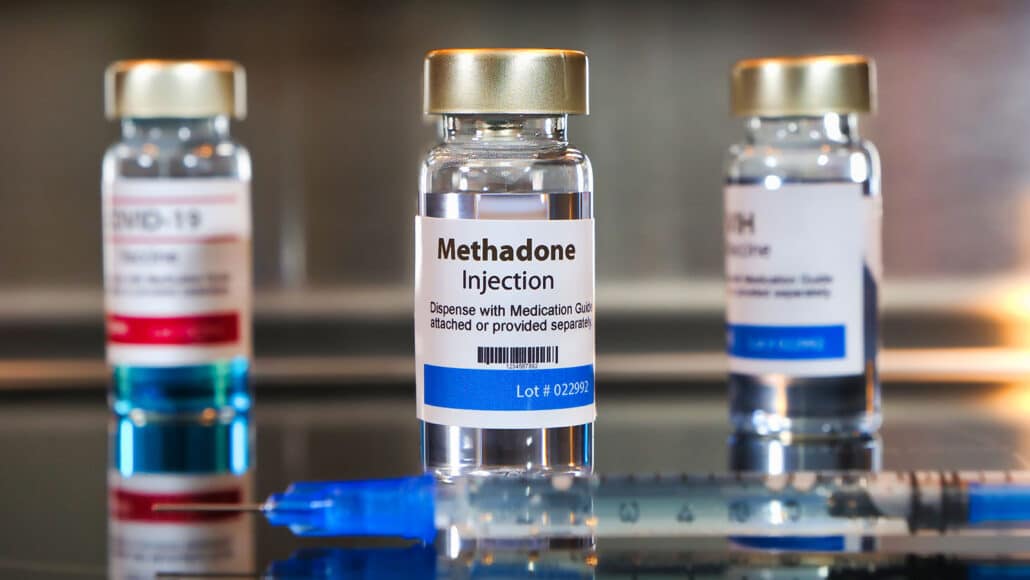Methadone is a synthetic opioid that is often used to treat opioid use disorder (OUD). When it is used as directed by a doctor or as part of a detox program, methadone can be very effective for those struggling with an addiction to heroin, morphine, or other opiates. Unfortunately, even though methadone can alleviate withdrawal symptoms such as nausea, insomnia, and anxiety, it is itself an opioid, and it is still highly addictive and easily abused. This is why we only recommend the use of methadone as part of a detoxification program or as prescribed by a doctor. Taking methadone on your own to overcome a drug habit merely replaces one addiction with another, resulting in substance use disorder.
If you are struggling with an addiction to an opiate such as heroin or morphine, taking methadone as part of opioid replacement therapy can be incredibly effective. Opiate and opioid withdrawal can be very painful, and managing these symptoms is often necessary to make it through the detox process. Long Island Interventions is dedicated to providing the support and clinical supervision necessary to ensure a successful detox through opioid replacement therapy.
Table of Contents
Methadone: A Double-Edged Sword
Methadone was first introduced in the United States in 1947 as an alternative to morphine to treat various medical conditions. In the 1960s, scientists started to look into the possibility of using methadone to treat heroin addiction, which was on the rise in the U.S.

The first program to use methadone as a treatment for heroin dependency began in 1971. The goal of these programs was to reduce the crime, spread of disease, and death associated with intravenous heroin use. For the most part, they were successful, although methadone use proved to be a double-edged sword. While opioid replacement therapy using methadone can alleviate symptoms of methadone withdrawal in a safe environment, it’s still just as addictive as any other opiate or opioid, one that is long-lasting and creates a strong high. It’s a popular drug among addicts for those reasons, and even people who take it to overcome heroin addiction can become dependent on it. This is why any methadone use should be closely regulated and reserved for a medical detox program.
Recognizing the Need for Detox
It’s possible to develop a physical dependency on opioids or opiates in as little as four weeks, even if you take an opioid as directed by your doctor. If you find that you are taking larger amounts of opioids than expected, are craving your drug of choice at all times, and are experiencing opiate withdrawal symptoms that you can’t manage, you might have opioid use disorder or OUD. OUD is a serious medical condition that often requires treatment in a medically assisted detox program. These programs usually involve taking a dose of methadone to alleviate opioid withdrawal symptoms, much like how you would taper off the use of an opioid medication prescribed by a doctor. If you don’t like to experience withdrawal symptoms – a severe withdrawal symptoms, the doses of methadone should become less and less until you can stop using it completely.
As useful as methadone has shown to be in treating OUD, many still find that they become addicted to the methadone itself. The symptoms of methadone addiction are the same as other opioid addictions and include:
- Anxiety
- Muscle aches
- Nausea
- Insomnia
- Abdominal cramps
- Vomiting
These symptoms are rarely life-threatening, but they are incredibly uncomfortable and difficult to manage. Prolonged usage of methadone and other opioids can produce more severe symptoms such as fever, chills, hallucinations, and high blood pressure. This is when the withdrawal is at its worst and almost always requires treatment from a medical professional.
The Methadone Detox Process
Methadone detox should always be under the supervision of a trained medical staff. Trying to quit methadone or other opioids or opiates “cold turkey” will increase the severity of the withdrawal symptoms, often to dangerous degrees.
Drug addiction treatment can vary from one program to the next, but here is what you can expect from a methadone detox program:
Initial Assessment: All drug rehab programs begin with an initial assessment. This is a medical evaluation to determine your needs and what kind of treatment you will need.
Tapering Off: You will be provided doses of methadone to lessen the severity of your withdrawal symptoms. These doses will gradually decrease as you detox.

Medical Supervision: Supervision from a trained medical staff is necessary to monitor and address withdrawal symptoms.
Addressing Psychological Aspects: Since addiction is almost always as much psychological as it is physical, detox programs include therapeutic support to cope with psychological challenges. This therapy typically continues once you’ve completed the detox program.
Duration of Methadone Detox
Methadone is a long-lasting drug that stays in your system longer than other opioids and opiates. but its withdrawal symptoms tend to be less intense, even if they do last longer. Quitting methadone cold turkey is not advised, as it can make withdrawal symptoms more intense and lead to a relapse. Within two days of quitting methadone cold turkey, you may experience fever and chills, a rapid heartbeat, and muscle aches. After three to eight days, your aches and pains will become more severe, and you will experience nausea, vomiting, anxiety, and restlessness. These symptoms will get worse at the nine-day mark, and you will likely experience depression and intense cravings for methadone.
After 15 days, those who quit methadone cold turkey may experience post-account withdrawal syndrome, where withdrawal symptoms such as fatigue and anxiety could last for years and may be permanent. This is perhaps the greatest danger of trying to quit methadone or other opioids cold turkey and the reason why you should consider entering a methadone detox program.
The duration of a methadone detox program can vary based on your level of dependency. A short detox program typically lasts about nine weeks, while longer programs last about six months. The goal of a methadone detox program isn’t to “quit” methadone but for long-term recovery. A shorter program that lasts between two and three months will likely help you get over the physical addiction with minimal discomfort, but longer programs with longer tapers often have better results.
Post-Detox Considerations
In most cases, the best treatment for opioid and opiate addiction is a detox program followed by ongoing outpatient care. This often involves therapy to help establish healthy patterns that help maintain long-term recovery from opioid addiction. It can also help address issues that may have led to your opioid abuse in the first place.

Alternative Treatment Options
Suboxone is a drug that is often used to treat opioid addiction instead of methadone. Although it is still an addictive substance, it contains naxolone, which blocks the euphoric effects of opioids and reduces the odds that it can be abused. It also produces fewer side effects than methadone and is safer to take during pregnancy.
Another drug similar to Suboxone is Zubsolv. Zubsolv comes in a small tablet that dissolves under the tongue. Due to its greater bioavailability than Suboxone, it contains smaller doses of its active ingredients and produces fewer side effects.
Conclusion
Opioid and opiate addiction is incredibly difficult to overcome on your own. Not only are the methadone withdrawal symptoms painful and potentially life-threatening, but there is a strong chance of relapse when you quit cold turkey. Methadone can help you overcome your dependency, but only if it is taken as part of a well-planned, medically supervised detox program from a healthcare institution.
For more information about long-acting opioid dependence or methadone dependency, methadone treatment, substance abuse treatment program, and withdrawal process available through Long Island Interventions, a detox center, contact us today or chat with us anytime through our website. Our staff is available 24 hours a day, so don’t hesitate to reach out if you or your loved one are struggling with opioid addiction and help yourself or them to improve well-being.
Please contact Long Island Interventions for information about Methadone Addiction Treatment near you.
FAQ
How can i get emergency methadone?
How long can you be on methadone?
Drug & alcohol detox programs are not directly offered by Long Island Interventions. However, we do recognize that this type of addiction treatment is often necessary and vital to one’s long-term recovery from substance abuse. If you or a loved one require any services that we do not offer we would be glad to refer you to one of our trusted affiliate providers.

